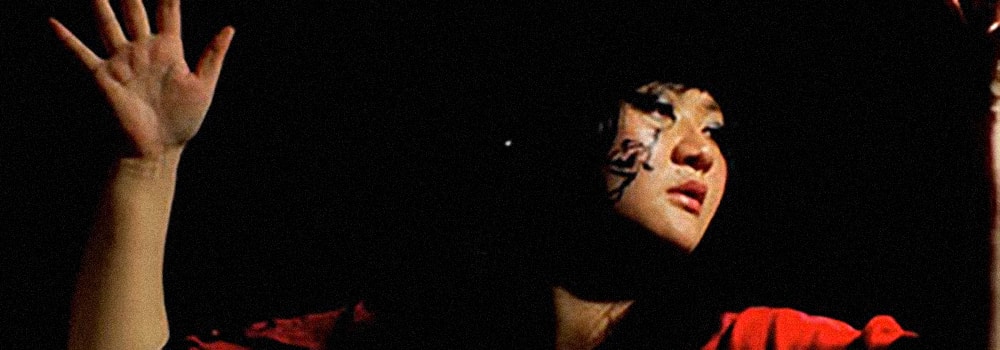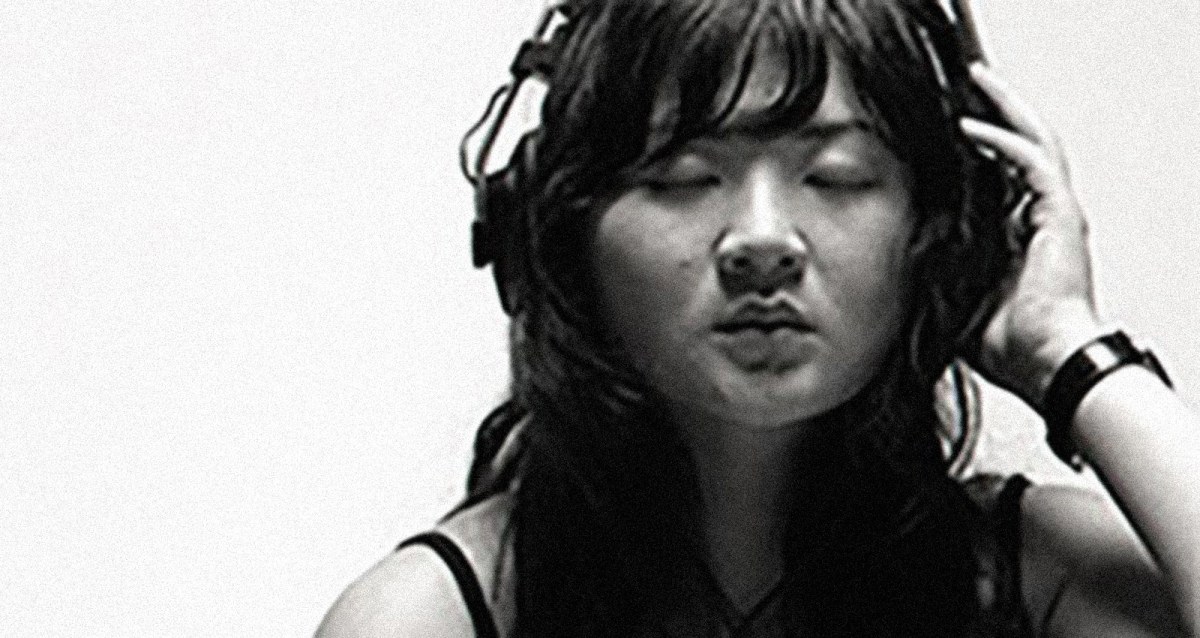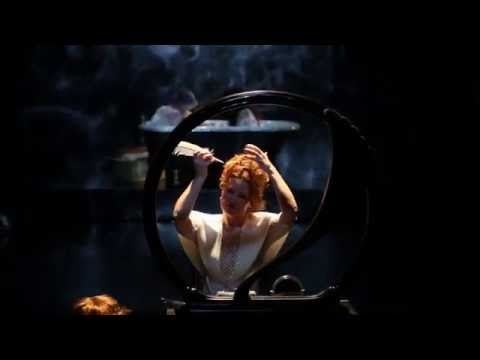On October 7, National Sawdust celebrated the CD release of Du Yun’s Pulitzer-prize-winning opera “Angel’s Bone” with a performance of excerpts from the work. The concert was preceded by a panel during which ethnomusicologist Lara Peligrinelli moderated a discussion between Du Yun, librettist Royce Vavrek, and conductor Julian Wachner. Through vocal, acoustic, and electronic sound, Du Yun’s opera tells the story of Mr. and Mrs. XE, a middleman and middlewoman who exploit fallen angels to make ends meet. During this performance, Wachner conducted five musicians of NOVUS NY performing the brash and visceral accompaniment, which included a killer oboe solo from Stuart Breczinski. Vocalists Abigail Fischer and Kyle Pfortmiller lent their voices to the parts of Mrs. and Mr. XE, but it was Du Yun’s utterly extraordinary, unrestrained performance of the Girl Angel that stole the show.
I interviewed Du Yun in the production office prior to the panel and performance, and found myself captivated by her easy-going conversation, hilarious mannerisms and facial expressions, and her bluntness in expressing her point of view.
Du Yun: [Erupting into giggles] I’m sorry, every time before a show, this is like my goofy phase. Like, I don’t do nervous very well.
VAN: Are you nervous?
No.
You’re just…?
Well, I haven’t memorized my lyrics yet. So, what’re you gonna do?
You can just wing it.
[Laughs]
What will you be performing tonight?
Our Girl Angel can’t be here tonight, so I’ll be singing the song “Brick J.” This was the first song that Royce and I came up with, from the whole entire thing. At the time, the title of the song was “Angel’s Bone.” But then, after two iterations of workshops and productions and whatnot, we started focusing more on the psyche of the middlewoman instead of the angel—the victim. I was quite adamant about the fact that, because neither of us were victims, there was only so much we could empathize. How deep can the empathizing really go?
I’ve always been interested in what people do when given the opportunity to exploit. What people do when nobody is looking. It can be very murky. Would you pick up that $10 from the street? $100? $1,000,000? What if nobody is looking and there are no consequences?
And as I did more research, I found that a lot of girls refer to the middleman as their “boyfriend.” When you really think about it, sexual abuse and domestic abuse are not that far from being pimped out. There are different forms and shapes that it takes.
I was reading a book about sex trafficking specifically in the U.S., and how so many people don’t really believe it’s a problem here. There are so many teens (and preteens) who, for whatever reason, whether drugs or disconnect from their families, end up with these kind of “boyfriend” figures who then exploit them in various ways…
…Boyfriend figures who take them under their wing. It’s a very prominent theme in Royce’s and my story. At first, we see the angels having their feathers pruned, being taken care of, and then we see Mr. XE nurturing them back to health. And I think that there are many instances where the captive falls in love with the captor.
The latest from VAN, delivered straight to your inbox
What was the compositional process like?
I don’t lie, I dramatize [laughs]. And I have a very good memory. [Royce and I] fell in love with each other’s work about a decade ago at New York City Opera’s Vox festival. I loved his language and his sensibility in telling a story, and we have similar taste in films. So we knew we had to work together in one way or another. And then I got a commission from the Mann Center for the Performing Arts in Philadelphia—they wanted me to do a chamber music thing, but they gave me a full night, including one new piece. So I thought, “Why not use that as an opportunity to jumpstart this project with Royce?” I thought maybe we could do something with Borges’s imaginary beings.
Du Yun and Royce Vavrek, “Angel’s Bone,” Mrs. XE’s Mirror Scene; Abigail Fisher (Mrs. XE), Michael McQuilken (Stage direction), Julian Wachner (Conductor), Trinity Wall Street Choir
Then I remember vividly this email from Royce: “Du Yun, I had a dream last night, I want to do something about angels.” And at the time I was reading this collection about middlemen, so I was like, “I wanna do something about human trafficking,” and voilà, there you have it. It wasn’t a situation where a librettist showed up with a libretto and then I set music to it. I’m also very proud that we wrote an original story.
I totally understand that art does not solve problems. It should serve as a catalyst for solving problems. As you were saying, people think that human trafficking is a very far-away problem, but it happens right in the City. And it’s not just sex trafficking. It’s a lot of different things: involuntary labor, illegal immigrants, fiancée visas, murky laws, and the whole industry resulting from that.
But I do welcome the commentary from people. For instance, somebody tweeted that they were absolutely appalled that this opera won a Pulitzer. She said it was secondary exploitation. And I think she’s right in a way, but when we wrote this we definitely weren’t thinking in terms of prizes or awards. I want to engage and welcome these conversations: Who owns narrative?
So you don’t feel like you’re speaking for this population of individuals?
Who am I to position myself to speak for anybody else? I think of myself more as a journalist or a documentary filmmaker. If a Pulitzer can be given to a photojournalist documenting war and conflict, why can’t a piece of music also deal with these topics?
A lot of political art is bullshit. I came from a country where political art is “a thing.” But in our field we already have so many composers who don’t want to engage that: they always say “a piece of music is a piece of music.” I think that a good piece of art can also engage with social justice topics. It doesn’t have to be mutually exclusive. It does require sensitivity, and compassion, and lots of research.

I’m wondering how you feel about content warnings, as specifically related to the opera, but also in general.
Well, I have a friend coming tonight who asked if she could bring her kids and I was like, “Probably not.” I would say don’t come to this opera if you’re 11 years old.
I teach at Peabody, and I just gave a lecture at another university. And afterwards I went out with some faculty members and they were talking about trigger warnings. It’s a huge thing now at liberal arts universities, they have to give a trigger warning when they hand out Schubert.
OK. I can be controversial. I am sensitive in the sense that I have never been a victim of political asylum, of rape, of abuse…but I do personally think that in terms of the educational system, it’s bullshit. Life is brutal and you can’t pretend it’s a vacuum when you’re educating other people. When catastrophes happen, you don’t get a fucking trigger warning. It’s an ultra liberalism that I don’t get, at all.
At this point another person affiliated with the evening’s event enters the room. Upon my introducing myself, the specter of my Ostrava Days review enters the space: “Oh, you’re that Rebecca! You’ve sure been getting around lately!”
You’re “that Rebecca,” what does that mean?
I wrote about sexism at a music festival and it made the organizers and participants of the festival really angry.
Oh that one! You were the one! Nice. You know what, people should be angry. All these men. Let me tell you. All these men…these men! They’re all like, “What do you think? Well, what I think, lalalala. Personal taste and all that.”
You know what I think? Let’s say you have two things and you pick one of them, you can absolutely say that’s your personal taste, right? OK, let’s say you have a hundred of something, and you still present 98 things that are the same, now your taste has a problem. As a curator, you do not stand on your own. You are not your own personal artist. You have a social responsibility.
All these men! “Well you know, like, just for argument’s sake.” [She crosses her legs and purses her lips.] But they really just want to hide away from it all, because they’re men, and they’re white, and all that. They think to themselves, “I know I need to be liberal, and I need to be sensitive, but then women are making a lot of noise, and how do I really feel about that?” They need to be educated.
It’s a valid question: What does taste mean?
At this point Du Yun is prompted to get dressed for the panel and performance.
Wait, you’re not wearing that?
No, these are my pajamas. But I can change very quickly. Sorry, I’ve been talking too much. I’m like this historical figure in the Chinese Revolution of this girl, like 13 or 14 years old, who would go out to the fields and just grab the Japanese army’s heads, all like, “Yaaa.” And she died of course, but she’s a national hero. Speaking of trigger warnings! And people always ask why I talk like I’m her, with no subtlety…
You’ve definitely got metaphorical decapitated heads hanging from your fingertips. Do you have any parting words?
I want to talk about equality, I think it’s important to talk about it. A lot of men say, “Oh, I don’t want to talk about that,” but that’s the ultimate freedom—to be able to choose not to.
And when we talk about social justice, it cannot only be pain and suffering, because people can exploit that. And programming 50-50 doesn’t really solve the problem if women don’t have the freedom to express their voices. Equality doesn’t mean statistics; it means having the dignity to say what we need to say.
It’s like you wrote: What does diversity really mean? What would it really mean to program more women? Well, we do have women, but we don’t even nurture women artists—and that’s the problem. ¶
Subscribers keep VAN running!
VAN is proud to be an independent classical music magazine thanks to our subscribers. For just over 10 cents a day, you can enjoy unlimited access to over 875 articles in our archives—and get new ones delivered straight to your inbox each week.
Not ready to commit to a full year?
You can test-drive VAN for one month for the price of a coffee.


